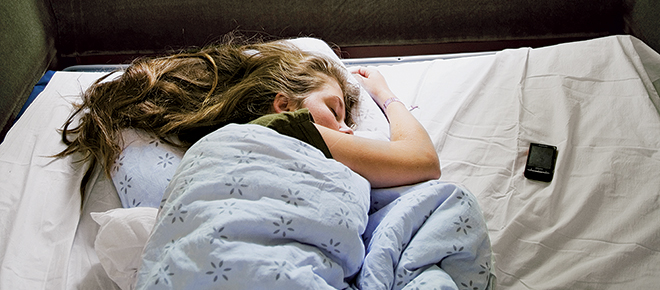Sleeping with a smartphone? Not so wise
The link between health and well-being and cellphone use
Share
 Madison Potter has a routine before bedtime. After she brushes her teeth and puts on her pyjamas, she’ll plug in her iPhone and put it right next to her pillow. Then she’ll turn off the lights and fall asleep with the phone six inches from her head. “It’s just habit now,” says the 20-year-old fine arts student at the Alberta College of Art and Design. “I’ve been doing it for four years.”
Madison Potter has a routine before bedtime. After she brushes her teeth and puts on her pyjamas, she’ll plug in her iPhone and put it right next to her pillow. Then she’ll turn off the lights and fall asleep with the phone six inches from her head. “It’s just habit now,” says the 20-year-old fine arts student at the Alberta College of Art and Design. “I’ve been doing it for four years.”
The vibration from incoming texts will occasionally wake her up, but her cellphone is there as an alarm clock. Also “in case there’s an important message in the middle of the night,” she says, “which is completely silly because there never has been.”
She’s not the only one snuggling up to her screen. Curt Wetmore, a 25-year-old grad student at Dalhousie University in Halifax, keeps his cell under his pillow because his small bedroom doesn’t allow for a bedside table and the outlet to recharge the battery is right by the head of the bed. “It’s more convenient, and maybe a little comforting to know that I have my phone by me,” he says. “I don’t why, but I definitely feel comfort for sure—which is sad.”
A 2010 Pew Research Center study of more than 2,000 adults found more than 90 per cent of Americans aged 18 to 29 sleep with a cellphone on or next to their bed. The same study, part of the Pew Internet and American Life project, showed those who text are 42 per cent more likely to sleep with their phones than those who don’t text.
There is no question students are having a tough time parting from their phones, especially when there is a constant stream of texts, emails, Facebook messages and Instagram pictures to check. The compulsion to stay plugged in, particularly on campus, could be hurting students’ grades. “Keeping your phone on or close to you at night essentially turns the average teenager into a shift worker,” says Charles Samuels, medical director of the Centre for Sleep and Human Performance in Calgary. “People have no idea how poor their daytime functioning is because of all of this disturbance and continuous connectedness with devices like these.”
Studies show sleep disruption has negative effects on memory and attention, and contributes to daytime fatigue. If Samuels had his way, the solution would be simple: “Cellphones go into the washing machine and stay there from 8 o’clock until morning—and if [students] go down to the washing machine, they find?.?.?.?a guard with a gun,” he says. “Turn the things off at night.”
The trouble with mobile phones could start well before bedtime. A recent study from Washington and Lee University in Virginia found interpersonal stress among university students correlated with higher levels of burnout among those who text frequently. Karla Murdoch, the study’s co-author, says students may use cellphones later into the night, pushing back their bedtimes. Then there’s research on how the light emitted by screens can inhibit the production of melatonin, which gives the body the signal to sleep.
Murdoch’s new study is designed to explore the relationship between student health and well-being and cellphone use. While she and her team are still collecting data, she says “a lot of students can describe a fair number of negative experiences in the middle of the night that have to do with their cellphones,” especially if the text is upsetting.
But some students say the texts don’t bother them unless they are persistent. They may not even remember reading a text until they’re fully alert in the morning, though that doesn’t necessarily mean they aren’t affected. “When you go to the extreme of putting your phone under your pillow at night—and answering or responding to calls—that’s not physiologically adaptive for anybody,” Samuels says. “Whether they remember it or not is irrelevant.”
Potter’s routine, meanwhile, isn’t likely to change. She doesn’t mind being awakened by her phone. In fact she frequently receives early-morning texts from her boyfriend two time zones away in Ontario, asking her how she slept. “And then I reply: ‘I’m still sleeping,’ ” Potter says. “ ‘Text you later.’ ”